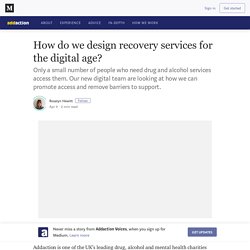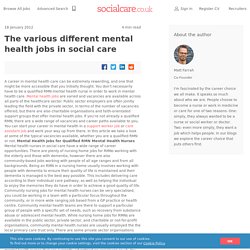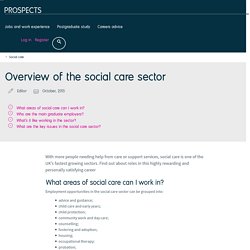

How I became a Trainee Psychological Wellbeing Practitioner. A question I am often asked is how I reached this point in my career.

I currently work in the NHS as a Psychological Wellbeing Practitioner (PWP). Achieving a place on the training course is getting more and more difficult each year, with services shortlisting hundreds of applications to eventually offer 4-6 places. A Psychological Wellbeing Practitioner career pathway: an exciting and diverse role. Psychological Wellbeing Practitioner (PWP) interventions can be beneficial beyond the field of mental health and used in prisons and occupational health, says Senior PWP Carolyn Houghton.

Reflecting on her own career development so far, Carolyn says the role of PWP can provide a long-lasting, rewarding and diverse career. The publication in 2005 of The Layard Report saw the proposal and development of the Improving Access to Psychological Therapies (IAPT) initiative and when I completed my university psychology degree in 2008 this was just beginning to come to life.
Upon graduating, I was lucky enough to be offered a Trainee Psychological Wellbeing Practitioner (PWP) role at Lincolnshire Partnership NHS Foundation Trust. 2. YH IAPT Providers Slides October 2018. How do we design recovery services for the digital age? I’m Rosalyn, product lead in our new digital team at Addaction.

Addaction is one of the UK’s leading drug, alcohol and mental health charities with services across England and Scotland. We work with people in a range of ways including in community settings, in prisons, in residential rehab and through outreach. Demand for drug and alcohol services mean that they are only used by a small proportion of people who need them. It’s estimated that only 1 in 5 people who need treatment for alcohol dependency are currently receiving it. This sets us a challenge — how can we change the way we deliver services and provide support so we can help more people? There are already examples within Addaction of digital being used to promote access and remove barriers to support. We introduced our webchat service in 2017 and already over 11,000 people have accessed help this way. We have big ambitions. The success of these two projects is just the start.
Thinking of a career in therapy? Here are your options. The route towards a career in counselling or therapy is baffling.

When I began my journey eight years ago, I was struck by the jargon and lack of clear, streamlined advice: would I need a PhD, masters or diploma? Should I specialise or generalise? Work with adults or children, individuals or groups, families or couples? Pursue humanistic, psychoanalytic or cognitive behavioural training? The mind guide to who s who 2013. The various different mental health jobs in social care. Matt Farrah Co-Founder A career in mental health care can be extremely rewarding, and one that might be more accessible that you initially thought.

You don’t necessarily have to be a qualified RMN mental health nurse in order to work in mental health care. Mental health jobs are varied and vacancies are available across all parts of the healthcare sector. Public sector employers are often jointly leading the field with the private sector, in terms of the number of vacancies offered, but there are also charitable organisations and faith-orientated support groups that offer mental health jobs. IAPT Commissioning Toolkit 2008. What To Expect In A Trainee PWP Interview – PsychAssist. Hello and WELCOME to PsychAssist.

Ok so it’s coming to that time of year again, where you might start to see an influx of Trainee PWP positions ready to start in September. Now for some of you, you may have applied before and received an interview but due to not being prepared, fell short of getting a place. Nevertheless, as always, PsychAssist is here to help! Within this post, we will explore What to Expect in A Trainee PWP Interview. Overview of the social care sector. With more people needing help from care or support services, social care is one of the UK's fastest growing sectors.

Careers in the psychological therapies. Psychological therapies infographic 1. Healthcare-network. The various different mental health jobs in social care - by Socialcare.co.uk. Psychological therapies. 404 - Page Not Found. The secret trainee social worker's diary: 'My experiences as a carer help me' Monday I get a call from the Think Ahead team, checking some details before I start my role with them in July.

I’ve been accepted on to their fast-track graduate programme, which means I’ll be joining an NHS mental health team to train as a social worker. My dad had bipolar disorder and I was his carer for many years. The experience helped me understand the barriers people with mental health problems face to participating fully in society. I applied to Think Ahead because I want to help other sufferers and their families.
Tuesday I meet a young woman as part of the volunteering I do with Carers Federation, mentoring young people who look after parents with mental health problems. Today’s mentee is applying to university, and I help her draft her personal statement. Wednesday Today is devoted entirely to study; I’m a final-year music student at the University of Nottingham and can’t afford to slack off. Psychological%20therapies%20infographic 0. Want to work as a mental health professional? Our top tips. How long does it take to qualify as a psychologist?

As a minimum, would-be clinical psychologists need to undertake an undergraduate degree [which can take three to four years] followed by three years’ clinical training, says clinical psychologist Dr Tim Smith. Expert advice on getting a job in mental health – live chat. Britons no longer find therapy taboo.

We now spend more than £385m a year on mental health – with the demand for therapy tripling in the last 10 years. And the benefits aren’t just for patients: working in the industry can be highly rewarding too. “I can’t think of a more fulfilling career, one that is designed solely to decrease suffering.
There’s nothing I’d rather do with my life,” says Dr John Duffy, clinical psychologist and author. “It’s an honour to do this work,” agrees Ryan Howes, therapist and author of Psychology Today’s In Therapy blog. Mental health charities can help people where the NHS cannot. With one in four people suffering from mental health problems each year, and one in 10 young people, the challenges facing services are significant.
This is a sizeable population and a range of responses is needed for their treatment, including community-based options. The role of the voluntary and community organisations in supporting mental health conditions is well established. These organisations are rooted in their communities, are trusted by the people they work with, have a long history of social action and user-led interventions, sit outside of clinical settings, and are able to offer significant and effective levels of support. The NHS Five Year Forward View explicitly refers to the voluntary and charitable sector as having an important role in helping to meet key challenges facing the health and social care system, and it argues for a new relationship with patients and communities.
CoolTan Arts, based in Southwark, is run by and for people with mental distress.